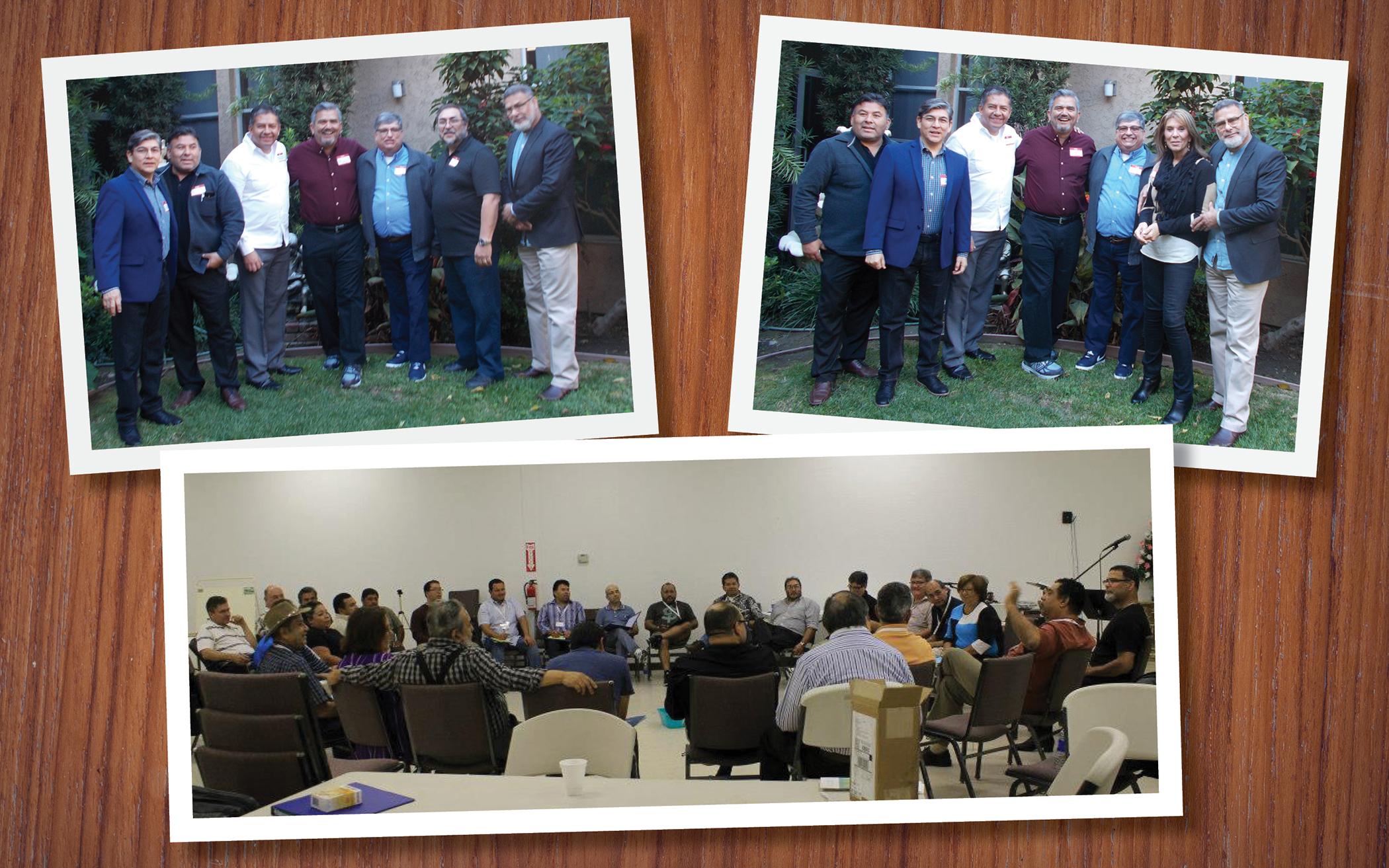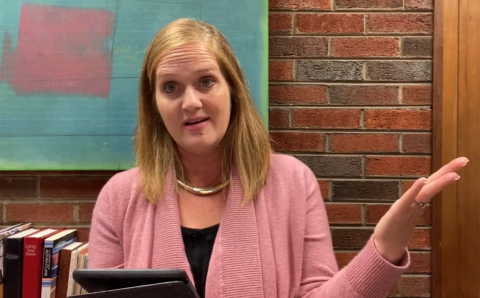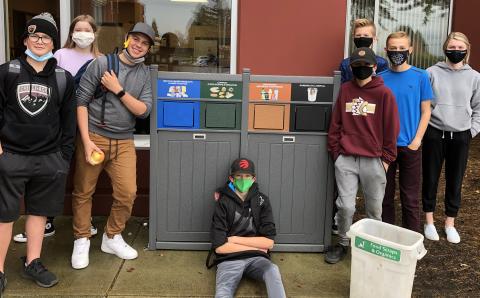Iglesia Todas Las Naciones, recognized as an emerging congregation of the Christian Reformed Church at the February meeting of Classis Zeeland, joins 50 Spanish-speaking congregations in the denomination. Over the past nine years, this growing branch of ministry has been encouraged and supported by Consejo Latino, an active network of Hispanic ministry leaders within the CRC and beyond.
It all started around a table in Ancaster, Ont., where Jose Rayas, church planter, father, and teacher at All Nations Seminary (El Paso, Tex.), was attending Synod 2012, the annual general assembly of the CRC. As Rayas spoke with other pastors, the dearth of networking and shared resources among Hispanic pastors in the CRC became apparent. With pastors Gianni Gracia and Eduardo Gonzalez, Rayas planned a gathering. In November 2012, 40 pastors met in El Paso. They shared dreams and grief and pooled resources. A year later, a core group from the gathering formed a catalyzing group, and in 2015 Consejo Latino officially formed. Rayas became secretary in 2017.
Martha Villafane is the pastor of Latin American CRC in Anaheim, Calif., a mentor for church planters with Resonate Global Mission, and, for the past two and a half years, board member of Consejo Latino. She said before the network, Latino church planters and pastors lacked a connection with denominational leadership. In fact, when Consejo Latino created a database of Hispanic churches in the CRC, they discovered double what church records said existed. “We wanted to create something new to support all our Latino churches because they are so alone,” Villafane said.
“We’re experiencing just about everything for the first time,” said Rayas. “We’ve never had this level of involvement in the past. (We are) the first council to represent the Hispanic ministry (in the CRC) and to interact between them and the denomination as a whole.”
With everything so new, Consejo Latino routinely convenes to evaluate their productivity, obstacles, and strategy. The most recent review came at the close of 2020, noting that in the past three years the group had hosted four regional conferences and four teaching seminars for Hispanic churches interested in joining the CRC.
Training Pastors
The seminars introduce participants to Reformed identity, CRC history and church order, creeds and confessions, hermeneutics, and more. It’s brought a “tremendous impact,” said Rayas, who is passionate about doctrinal unity and multicultural diversity in the CRC. “Some of the folks we had in Phoenix, in example, came as far as from New Jersey. One was a pastor who wanted to affiliate with the CRC because of what he had heard but he wanted to know for sure.” Many churches are “disgruntled with their denominations because of the beliefs they’re trying to put on them,” Rayas said.
In the CRC, ordination is a prerequisite to applying for funds for church plants or emerging churches, so Consejo Latino has concentrated efforts into providing resources for those seeking ordination. Rayas, Villafane, and Harold Caicedo, president of Consejo Latino, teach Spanish Language Institute in Ministry, a CRC training for pastors not yet ordained in the denomination.
Assisting Churches to Affiliate
While the seminars and training serve churches within North America, Consejo Latino also has connections to churches in Venezuela, Mexico, and Cuba.
There, influenced by Reformed missionaries who visited those countries, seminary students are often discipled in Reformed thinking. When the churches they plant begin looking for a wider affiliation, the CRC is an option. Consejo Latino currently has contact with 50 churches throughout Latin America considering affiliation. “It’s a big jump in just a few years to even identify these. Most people didn’t even know where these Hispanic churches were,” said Rayas.
The affiliation process can take six months to two years, and Consejo Latino helps bridge the cultural gap in everything from documents and paperwork to doctrinal differences in areas such as infant baptism and speaking in tongues.
“I was an outsider, too, when I came into the CRC 18 years ago,” says Villafane. Now she heads the recruitment for Consejo Latino. When she joined the CRC, she accepted the theology and practices that were different to her, and she has come to deeply love them. “It’s the same as family values. We train people to respect these family values. We have a beautiful denomination, very warm. (The people entering) feel respected, valued, and that is so important.”
Consejo Latino is conscious of being a link that serves not only Hispanic churches, but the denomination itself. It’s a “two-way learning process,” said Rayas. “There are things that we’re learning for the first time and things that the denomination is experiencing for the first time because of this. It brings to the forefront how things can change as the denomination truly becomes more culturally and ethnically diverse.”
Collective, Mutual Leadership
Consejo Latino’s eight-member board reflects this dual purpose. Caicedo is a member of the denomination’s Council of Delegates; Villafane and Scott Guerink both serve with Resonate; Rudy Gonzalez is with the CRC’s Race Relations. Ernest Eber, a commissioned pastor and church planter in Florida, is working with a university to create a 12-month program for ministry leaders interested in joining the CRC; Christian Sebastia and Rayas are church planters networking with others interested in planting Hispanic churches, and Gracia, one of the two to help Rayas with that first 2012 meeting, is a pastor.
Consejo Latino is working hard, but they rely on the denomination to reciprocate. “If the denomination wants to be serious about engaging ministry in the Hispanic context, they have to be a part of it,” said Rayas. “The church is going to have to move in the direction of inclusion of other worship styles and different cultural contexts; however, the theological and doctrinal must remain. If we lose that, we lose our identity as a truly Christian Reformed Church. We want the denomination to be attractive not only because of its worship style but because of its theology.”
Related: Massachusetts Church Hosts Multilingual Worship Fest
Consejo Latino might have already accomplished much, but their focus is forward. In the United States, Latinos are the largest minority, numbering around 60 million. “What are 50 churches in 60 million?” asked Villafane.
About the Author
Maia VanderMeer is a freelance news correspondent for The Banner. She lives in Mission, B.C.








